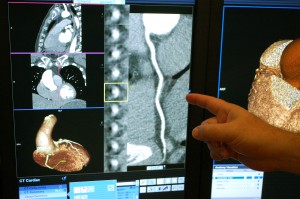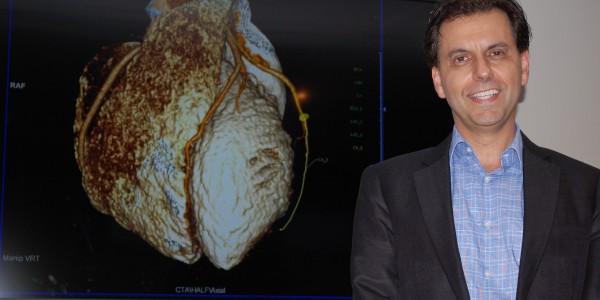VGH first in Canada to offer 24/7 on-site coverage for emergency cardiac CT scans

Cardiac CT scans can be manipulated to look for calcium / cholesterol buildup (plaque) in coronary arteries and provide images of such internal structures of the heart such as the valves.
If chest pain strikes in the middle of the night, patients are taken to hospital for assessment, ECG and blood tests to check for signs of heart attack. In some patients, the results from these initial investigations aren’t clear and further testing is needed. Recently, new CT scanner technologies have been developed that can ‘freeze’ the motion of the heart and allow patients to receive a non-invasive evaluation of their heart’s coronary arteries for blockages. If cardiac CT is performed in these patients with chest pain and indeterminate early results, a normal CT scan result can mean that patients can be safely discharged home without having to stay for more prolonged, more invasive testing.
At VGH, the introduction of in-house 24/7 subspecialty emergency trauma radiologist coverage with all radiologists qualified to read these cardiac CT scans has enabled this new, non-invasive pathway. Now, patients can have their emergency cardiac CT scans interpreted by a staff radiologist within 20 minutes at all times of the day or night. The change in availability of cardiac CT has the potential to decrease the use of more invasive and costly testing and may decrease the length of stay for patients in VGH’s busy emergency department. Patients will need to meet appropriateness criteria that have been validated in large clinical trials in the United States in order to qualify for the examination, and ongoing evaluation will help to further elaborate the advantages of this highly innovative approach.
“When a patient presents to the Emergency Department with acute chest pain, it’s a high-risk situation and we need a high level of confidence that neither their heart nor major blood vessels are responsible for their pain,” explains Dr. Savvas Nicolaou, director of emergency trauma radiology at VGH.
Dr. Hugue Ouellette, radiologist, notes: “Providing in-house cardiac CT scans with 20-minute interpretation throughout the day and night is a new level of care which places additional critical information in the hands of emergency physicians.”
Dr. John Mayo, Head of Medical Imaging for Vancouver Acute agrees. “The information provided by cardiac CT is useful in the management of limited hospital resources.”
While the ability of VGH radiologists to provide a timely diagnosis has the potential to reduce wait times, and allow patients to be safely discharged home to free bed space at VGH’s busy emergency department, patients at other hospitals in the Lower Mainland need not worry, as currently there is no evidence that waiting until the next day for a coronary CT could negatively affect their outcome.
Recent scientific studies in the United States published in the New England Journal of Medicine and Journal of the American College of Cardiology: Cardiovascular Imaging have shown that cardiac CT scans are highly useful to assist in patient management in patients who have a low to medium probability of acute coronary syndrome. These US trials demonstrated reduced length of stay in the emergency room and suggested potential for reduced costs. While other cardiac examinations such as ECG, blood tests, and stress treadmill testing only indirectly assess the coronary arteries, cardiac CT scans allow the radiologist to directly evaluate the coronary arteries for blockages.

